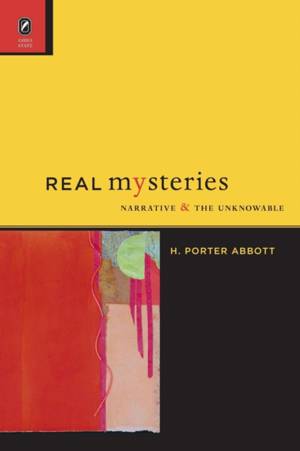
Bedankt voor het vertrouwen het afgelopen jaar! Om jou te bedanken bieden we GRATIS verzending (in België) aan op alles gedurende de hele maand januari.
- Afhalen na 1 uur in een winkel met voorraad
- In januari gratis thuislevering in België
- Ruim aanbod met 7 miljoen producten
Bedankt voor het vertrouwen het afgelopen jaar! Om jou te bedanken bieden we GRATIS verzending (in België) aan op alles gedurende de hele maand januari.
- Afhalen na 1 uur in een winkel met voorraad
- In januari gratis thuislevering in België
- Ruim aanbod met 7 miljoen producten
Zoeken
Omschrijving
The influential and widely respected narrative theorist, H. Porter Abbott, breaks new ground in Real Mysteries: Narrative and the Unknowable. In it, he revisits the ancient theme of what we cannot know about ourselves and others. But in a sharp departure, he shifts the focus from the representation of this theme to the ways narrative can be manipulated to immerse "the willing reader" in the actual experience of unknowing. As he shows, this difficult and risky art, which was practiced so inventively by Samuel Beckett, was also practiced by other modern writers. Abbott demonstrates their surprising diversity in texts by Beckett, Gabriel García Márquez, Herman Melville, Toni Morrison, Alice Munro, J. M. Coetzee, Tim O'Brien, Kathryn Harrison, and Jeanette Winterson, together with supporting roles by J. G. Ballard, Gertrude Stein, Michael Haneke, and Pseudo-Dionysius the Areopagite. The demands of this art bear directly on key issues of narrative inquiry, including the nature and limits of reader-resistant texts, the function of permanent narrative gaps, the relation between experiencing a text and its interpretation, the fraught issue of aligning grammatical and narrative syntax, the mixed blessing of our mind-reading capability, and the ethics of reading. Despite its challenges, this book has also been written with an eye to the general reader. In accessible language, Abbott shows how narrative fiction may create spaces in which our ignorance, when it is by its nature absolute, can be not only acknowledged but felt, and why this is important.
Specificaties
Betrokkenen
- Auteur(s):
- Uitgeverij:
Inhoud
- Aantal bladzijden:
- 192
- Taal:
- Engels
- Reeks:
Eigenschappen
- Productcode (EAN):
- 9780814252741
- Verschijningsdatum:
- 1/06/2016
- Uitvoering:
- Paperback
- Formaat:
- Trade paperback (VS)
- Afmetingen:
- 152 mm x 229 mm
- Gewicht:
- 290 g

Alleen bij Standaard Boekhandel
+ 101 punten op je klantenkaart van Standaard Boekhandel
Beoordelingen
We publiceren alleen reviews die voldoen aan de voorwaarden voor reviews. Bekijk onze voorwaarden voor reviews.









